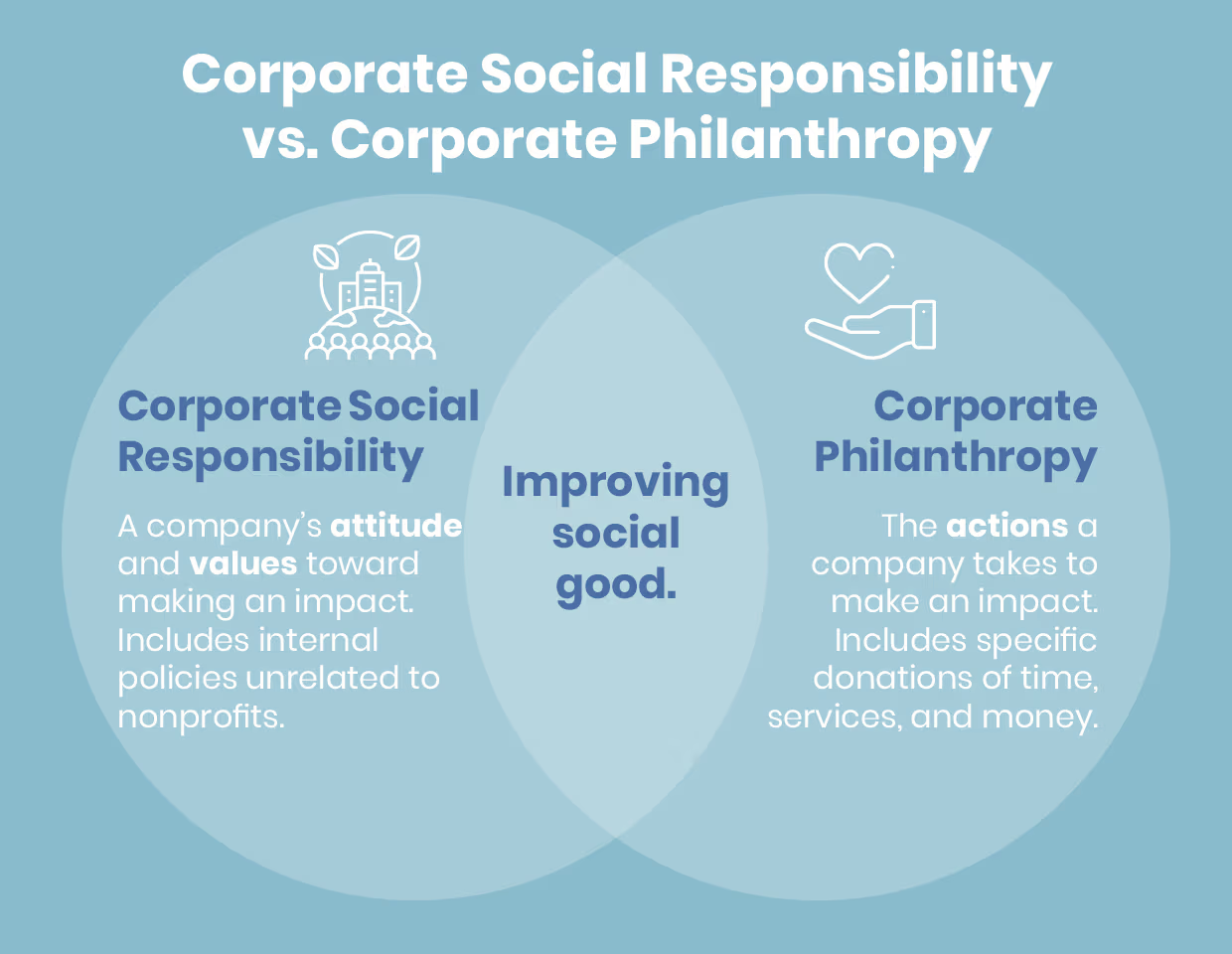Discovering Just How Corporate Philanthropy Shapes Brand Credibility and Client Loyalty
Corporate philanthropy considerably influences brand online reputation and client loyalty. Companies that take part in authentic charitable campaigns frequently see a positive change in exactly how consumers regard them. This placement of worths fosters trust fund and psychological connections with target markets. The performance of these humanitarian efforts can differ significantly. Understanding what genuinely resonates with customers is vital for brand names looking for to enhance their social effect and market placement. What approaches will become crucial for future success?
The Development of Company Philanthropy
As businesses significantly acknowledge their duty in society, the advancement of corporate philanthropy has changed from mere philanthropic contributions to a critical part of brand identification. Companies engaged in philanthropy mostly for tax obligation advantages or to improve their public photo. Over time, this method changed as stakeholders-- consisting of clients, capitalists, and employees-- required an extra authentic commitment to social responsibility.
Organizations began straightening their humanitarian campaigns with their core worths and company goals, resulting in even more impactful and thoughtful contributions. This modification has actually motivated business to invest in sustainable practices and community development, fostering a feeling of purpose that resonates with consumers.
Technical improvements have actually promoted transparency and interaction, permitting businesses to display their kind initiatives a lot more successfully. Business philanthropy has arised as an important part of business approach, with organizations welcoming the opportunity to favorably influence society while boosting their general brand name story.
The Effect of Philanthropy on Brand Name Understanding
While firms take part in philanthropic initiatives to advertise social great, these campaigns considerably form brand understanding among consumers. Business philanthropy can boost a brand name's photo by connecting it with favorable social influence and area participation. Consumers often view brands that proactively join charitable tasks as more trustworthy and liable. This perception can affect buying choices, as consumers might prefer brand names that show a dedication to social concerns.

Building Emotional Links Through Granting
Business philanthropy works as a powerful device for enhancing brand identity by linking company values with neighborhood requirements. With calculated giving, companies can cultivate area involvement and create shared values that resonate with consumers on an emotional level. This method not only enhances brand name online reputation however also develops lasting links in between services and their stakeholders.
Enhancing Brand Name Identification
When business take part in humanitarian initiatives, they not only add to societal good but also forge much deeper psychological links with their target markets. By aligning their brand with charitable causes, companies boost their identity and signal values that reverberate with customers. This alignment creates a narrative that goes beyond services and products, inviting consumers to take part in a shared mission. As consumers progressively prioritize purpose-driven brands, firms that proactively participate in providing can differentiate themselves in a congested market. Such campaigns cultivate a sense of loyalty amongst consumers that feel personally attached to the brand's worths. Eventually, business philanthropy becomes a crucial device for enhancing brand name identity, growing enduring relationships based upon shared ideas and emotional engagement.
Fostering Community Involvement
Various researches suggest that firms participating in community-focused kind efforts can noticeably strengthen psychological links with their stakeholders. By purchasing neighborhood projects and sustaining social causes, businesses cultivate a feeling of belonging and trust within the neighborhood. This involvement fosters a favorable brand name image, as consumers appreciate firms that demonstrate real worry for social concerns. Staff members commonly really feel more honored and motivated to be associated with an organization that prioritizes area welfare. Therefore, consumers are much more most likely to create commitment in the direction of brand names that proactively add to meaningful causes. Ultimately, promoting neighborhood interaction with philanthropy not just improves brand name online reputation but also builds lasting emotional ties that profit both the company and the community it offers.
Developing Shared Worths
Just how can organizations properly develop common worths that resonate with their stakeholders? Firms can attain this by aligning their humanitarian efforts with their core objective and the interests of their communities. By involving in campaigns that address regional requirements, organizations promote psychological links with consumers, enhancing brand commitment. For example, partnering with non-profits that show shared values strengthens the brand name's picture and demonstrates dedication to social responsibility. In addition, transparent communication about these initiatives enables stakeholders to see the tangible influence of their contributions. Ultimately, by incorporating shared worths right into their business philanthropy, companies not just improve their reputations yet likewise grow enduring relationships with customers, causing boosted loyalty and depend on. This alignment is essential in contemporary consumer decision-making.
Situation Researches: Effective Philanthropic Campaigns
Checking out successful kind campaigns exposes various methods that boost brand online reputation. Impactful area initiatives, cutting-edge partnership designs, and lasting engagement methods have actually shown reliable in promoting favorable connections with consumers. These instance studies highlight the relevance of thoughtful company giving in accomplishing both social and organization goals.
Impactful Area Initiatives
Many business have effectively leveraged kind campaigns to enhance their brand track record while making a meaningful influence in their areas. An innovation firm released an electronic literacy program in underserved neighborhoods, supplying training and sources that encouraged neighborhood homeowners. This campaign not just added to area growth yet likewise positioned the business as a socially accountable leader. A significant food firm applied an appetite alleviation project, partnering with regional nonprofits to distribute meals to households in demand. This initiative enhanced neighborhood ties and cultivated consumer commitment. With these impactful initiatives, companies have actually demonstrated their dedication to social duty, successfully aligning their brand worths with the requirements of the communities they serve, inevitably boosting their total track record.
Ingenious Partnership Versions
The success of impactful neighborhood initiatives often depends upon ingenious partnership models that bring with each other diverse stakeholders to address facility social difficulties. Study illustrate just how firms, non-profits, and federal government entities can collaborate properly. For example, a multinational firm partnered with a local charitable to launch an education and learning program, pooling resources and knowledge to boost neighborhood proficiency rates. An additional example involved a tech firm and a healthcare company signing up with forces to establish a telemedicine solution for underserved populations. These partnerships not just amplified the reach of humanitarian initiatives but likewise enhanced the brand names' credibilities by straightening their goals with area needs. Eventually, cutting-edge collaboration models serve as a stimulant for purposeful change and foster stronger connections between brand names and their customers.
Lasting Engagement Techniques

Measuring the ROI of Corporate Social Responsibility
As firms significantly purchase business social responsibility (CSR) campaigns, recognizing the return on investment (ROI) associated with these initiatives ends up being vital. Measuring ROI in CSR is complex, commonly including both qualitative and measurable metrics. Monetary returns can be assessed with increased sales, boosted brand commitment, and enhanced employee spirits, which can result in greater efficiency. In addition, business might examine cost financial savings linked to lasting practices, such as lowered waste or energy intake.
Qualitatively, the effect of CSR on brand name credibility can be assessed through customer perception research studies and social media belief evaluation. Surveys can supply understandings into just how CSR activities influence consumer loyalty and depend on. In addition, benchmarking against sector standards can assist organizations assess their CSR performance. Eventually, a comprehensive strategy to determining ROI makes it possible for companies to make educated choices about future CSR investments, lining up approaches with both financial performance and social effect
Consumer Expectations and Business Duty
Significantly, consumers expect business to operate with a solid feeling of company duty, viewing honest methods as a requirement for brand name commitment. This change in assumption mirrors an expanding recognition of environmental and social problems, leading consumers to prefer brand names that straighten with their worths. Customers are more likely to sustain business that involve in clear methods, show sustainability, and add favorably to their neighborhoods.
Social media intensifies these assumptions, allowing consumers to share their point of views and experiences rapidly. Brand names that fail to satisfy these ethical criteria take the chance of reaction, while those that embrace company obligation typically delight in superior track record and customer commitment. As consumers require accountability, companies must integrate company social obligation right into their core strategies, focusing on ethical actions not just as a marketing strategy, yet as a fundamental facet of their procedures. This placement can eventually lead to stronger brand name affinity and see this page continual success in open markets.
Future Patterns in Corporate Philanthropy and Brand Commitment
The landscape of corporate philanthropy is advancing, influenced by the heightened customer expectations bordering company duty. Companies are progressively incorporating social impact right into their core business techniques, not just as a secondary task. Future fads show a change towards openness, with brands sharing in-depth information about their humanitarian campaigns and their direct impacts on areas.
Technology is playing a vital function, making it possible for real-time involvement in between brands and customers. Social media platforms help with direct communication, enabling consumers to voice their expectations and hold brands responsible. Additionally, younger generations, particularly Millennials and Gen Z, prioritize sustainability and ethical practices, driving businesses to adopt more conscientious approaches.
As corporate philanthropy becomes synonymous with brand name identity, companies that authentically straighten their missions with societal needs are most likely to cultivate more powerful client loyalty. This convergence of values will inevitably form the future of company reputation and customer partnerships in a progressively conscientious marketplace.
Frequently Asked Inquiries
Just How Do Consumers Learn about a Firm's Philanthropic Efforts?
Customers find a business's philanthropic initiatives with different channels, consisting of social networks, news release, community occasions, and word-of-mouth. These opportunities assist in understanding, enabling people to engage with brand names that line up with their interests and worths.
What Function Does Employee Involvement Play in Company Philanthropy?
Worker involvement in company philanthropy enhances involvement, promotes a feeling of ownership, and strengthens group cohesion - corporate philanthropy. This involvement frequently enhances the impact of philanthropic initiatives, bring about greater recognition and support for the firm's philanthropic initiatives
Can Corporate Philanthropy Backfire on a Brand's Track record?
Corporate philanthropy can undoubtedly backfire on a brand name's online reputation if viewed as opportunistic or insincere. Unfavorable public assumption may develop, his explanation bring about decreased depend on and loyalty among consumers that focus on authenticity in business activities.
Are Smaller Sized Companies as Effective in Philanthropy as Larger Companies?
Smaller sized companies can be just as effective in philanthropy as larger companies, usually demonstrating agility and authenticity. Their local initiatives may resonate a lot more deeply with areas, cultivating genuine connections in spite of restricted resources compared to their larger equivalents.
How Can Business Select the Right Triggers to Assistance?
Business can pick the appropriate trigger by straightening their worths with neighborhood needs, examining stakeholder interests, and reviewing prospective influence. This tactical approach promotes credibility, boosts involvement, and reinforces links with consumers and the more comprehensive neighborhood.
While business engage in humanitarian efforts to promote social excellent, these campaigns greatly form brand name assumption amongst consumers. As consumers increasingly focus on purpose-driven brands, firms that proactively engage in giving can distinguish themselves in a crowded market. Numerous companies have efficiently leveraged kind projects to enhance their brand pop over to this site name reputation while making a purposeful influence in their neighborhoods. Increasingly, customers anticipate companies to run with a solid sense of company obligation, seeing ethical methods as a prerequisite for brand loyalty. As corporate philanthropy comes to be associated with brand identification, companies that authentically straighten their objectives with societal demands are most likely to promote stronger consumer loyalty.